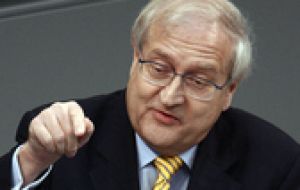MercoPress. South Atlantic News Agency
GM decision to hang on to European subsidiaries triggers controversy
 German Economy Minister Rainer Bruederle wants taxpayers’ money back
German Economy Minister Rainer Bruederle wants taxpayers’ money back General Motors decision to hang on to its European car unit Opel including Vauxhall in Britain, was welcomed in the UK but met with anger in Germany. Unite union chief Tony Woodley, a former Vauxhall worker, hailed the news as a “fantastic decision”.
But unions in Germany said workers would begin walk-outs from Thursday in protest at GM's decision. The German government, which had backed the sale of Opel, demanded GM repayment of a 1.5 billion Euros loan.
German leaders and labour unions had favoured a sale, to Canadian car parts maker Magna, as the best way to save German jobs as it included a guarantee that no German factory would be closed.
“General Motors' behaviour shows the ugly face of turbo-capitalism,” said Juergen Ruettgers, premier of the state of North Rhine-Westphalia, where there are fears that the Opel plant in Bochum could face closure. The German government has also responded angrily: “We will get back taxpayers' money” German Economy Minister Rainer Bruederle said.
“The behaviour of General Motors towards Germany is totally unacceptable,” he added.
“General Motors alone is responsible for this development. Only yesterday the workers signalled that they were prepared to consider wage sacrifice as a solution. It's up to General Motors to go back to the workers.”
The German government had provided the 1.5 billion-Euro bridging loan to Opel to keep it afloat during the long, drawn out negotiations over the past few months to find a buyer.
GM first said in March that it wanted to offload Opel, which includes Vauxhall, when the US firm entered a period of bankruptcy protection that eventually saw it emerge with the US government as its biggest shareholder.
After months of negotiations, GM finally agreed to sell the brands to Magna in September, with the German government pledging Magna 3 billion Euros in loan guarantees on top of the existing bridging loan.
Industrial union IG Metall said workers at Opel's four German plants would halt work - so-called “warning strikes” - on Thursday. Other plants in Europe would follow on Friday, it said.
Opel employs a total of 54,000 workers across Europe, with 25,000 based in Germany.
In the UK, its Vauxhall brand employs 5,500 people across two plants in Luton and Ellesmere Port.
The decision to sell Opel to Magna had been controversial because of the German government's offer of the 4.5 billion Euros in loans.
The European Commission warned last month that Berlin's offer of this aid may breach European competition rules, although the German government immediately denied any wrongdoing.
But on Tuesday the US giant said it had now decided not to sell the business because of “an improving business environment for GM over the past few months”, and would now be seeking aid for Opel from all the European states where it has operations, including Germany.
The BBC's Berlin correspondent Steve Rosenberg said the decision was a “huge embarrassment” for Germany's recently re-elected Chancellor Angela Merkel.
“Her government had lobbied hard in support of the Canadian car parts supplier. The governor of the state of Hesse, where Opel has its headquarters, also said he was 'shocked and angry'.”
Russian Prime Minister Vladmir Putin also waded into the row, saying he was “surprised” by the decision. State-owned Sberbank, the country's largest lender, was to have backed the Magna takeover.
“According to our information the Magna-Sberbank consortium is intending to carry out discussions with General Motors very soon and carry out a deep legal analysis of the situation,” Mr Putin's spokesman added.




Top Comments
Disclaimer & comment rulesCommenting for this story is now closed.
If you have a Facebook account, become a fan and comment on our Facebook Page!